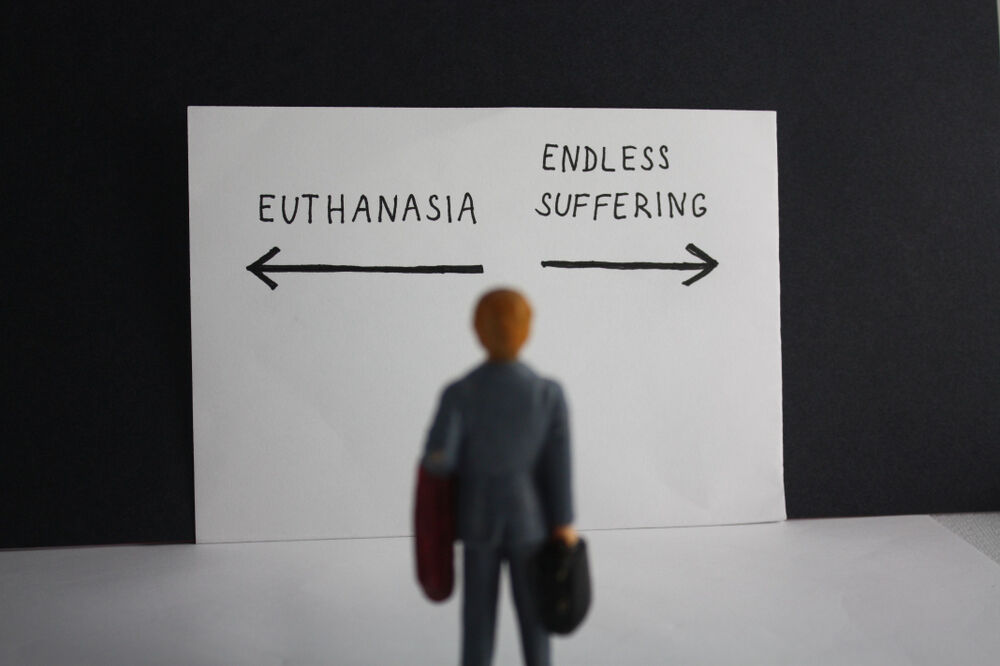Assisted Suicide and the Distortion of Language

What was supposed to be a robust Bill built on some of the strongest safeguards in the world this week was left looking like a hollow shell as its flagship requirement was dropped.
Kim Leadbeater has decided to do away with her own safeguard and dispense with the need for someone’s death to be signed off by a High Court Judge. It was an announcement that has been met with outcry both within Westminster and the press, not least because she had studiously denied such rumours in the weeks leading up to it.
While we can’t say that we are surprised at this latest development, having repeatedly said that ‘safeguards’ do not hold, but are swiftly eroded, the way in which the discussion has been conducted does expose some of the pure politicking which has been on display from the proponents of Assisted Suicide.
If you were to listen to Kim Leadbeater, getting rid of the High Court Judge is essentially a case of ‘nothing to see here’, despite the fact that this ‘safeguard’ was cited by more than 60 MPs during the Second Reading Debate as important to their provision of support. Leadbeater herself mentioned it six times within the original debate.
Instead, the High Court Judge process is now to be replaced by “panels of experts” including a senior legal figure, a psychiatrist, and a social worker. These panels would be overseen by a Voluntary Assisted Dying Commission led by a High Court Judge.
As Jamie Gillies has pointed out, the original plans may have been unworkable, given the demands already placed on High Court Judges. Nevertheless, the promise was key to the Bill’s passage and there are reports that as many as 142 MPs could now change their vote. Reform Parliamentarians Lee Anderson and Rupert Lowe are among the first to come out publicly against the new proposals, despite having initially supported the Bill.
With even those who support the principle of Assisted Suicide expressing their grave concerns over the state of this Bill and the scrutinising process the debate now seems very much up in the air.
Despite the dramatic changes, Leadbeater has hailed the changes to the Bill as actually increasing the number of safeguards, with her claiming that some are now writing to her to say the amended Bill has “too many safeguards”.
Yet this is not an example of good and responsive policymaking, as she claims: such language is all ‘smoke and mirrors’. I would have to agree with the criticism from the 10 Labour MPs who put out a joint statement this week: “All MPs have an important job to do to make sure that the assisted dying Bill is fit for purpose. Yet the process feels chaotic, with the Bill changing significantly from what was presented to Parliament at second reading.”
A matter of politics
The sad truth though, is that the politics and misleading language on view here is nothing new. For this has not been an honest fight, with plenty to question throughout the process.
The introduction and progression of the Bill through Parliament has itself been critiqued, for the manner of its introduction, the length of time given to MPs to scrutinise the legislation, and more recently for the distorted constitution of the Public Bill Committee which comprises 14 advocates and only 9 critics of the Bill despite the Parliamentary votes suggesting a far more evenly split House.
Even during the committee stage, there is much to be critiqued, with commentator Dan Hitchens noting that of those asked to give evidence, “24 supporters were invited to testify, 20 or so neutrals, and only five opponents”. Hugo Timms, draws attention to the failure to question even a single witness from Canada, whose Assisted Suicide legislation has been the subject of particular ire in recent years.
Process matters. And language matters too. For it has been clear for some time that the proponents of the Terminally Ill Adults (End of Life) Bill have been committed to misleading language, in a bid to introduce Assisted Suicide in England and Wales.
We are all aware of the effort to rebrand the campaign under the title of ‘Assisted Dying’: ‘Assisted Dying’ suggests a process in which a patient is merely helped in the course of their death, rather than the rather more artificial and brutal sounding ‘Assisted Suicide’, which intimates a procedure of death brought on artificially and deliberately.
If we were to use terms accurately, the term ‘Assisted Dying’ ought to be the language of the hospice movement and palliative care; we all want to ensure patients receive the support they need to be made as comfortable as they can possibly be during the course of their death.
This Bill, however, is not in the business of easing death but of causing it. Rather, it is very much the domain of ‘Assisted Suicide’.
The importance of words
The use and control of language in politics is an important part of political campaigning with a carefully worded title or strategically placed clause able to transform public perception as aptly demonstrated during the debate itself.
At Second Reading, leading critic of the Bill Danny Kruger was accused under a point of order from Cat Eccles MP of using offensive language for referring to ‘Assisted Suicide’, rather than her preferred term ‘Assisted Dying’ in a clear attempt to police language and swing the debate in favour of the Bill.
Likewise, ideas such as ‘compassion’, ‘dignity’, ‘safety’, ‘empathy’, and ‘autonomy’ have all been invoked by leading proponents of the new legislation to justify its introduction and safeguard the debate from criticism.
But how can we talk about notions like ‘dignity’ and ‘autonomy’ in this way, when some nations which have brought in Assisted Suicide are helping their disabled people to die rather than giving them the support they need to live, and when we face the obvious pressures of limited state resources, a malfunctioning healthcare system, and tragically instances of coercion and manipulation?
I don’t want to be unfair to those who are putting forward this legislation: I do genuinely take Assisted Suicide proponents at their word when they say they wish to end suffering and to bring about a more merciful settlement. Some of the stories cited in the debate are horrific.
But people are right to outline such Orwellian levels of double-speak. For the great distortion here concerns something more fundamental than Parliamentary process, or political discourse: the question is what do the words ‘mercy’ and ‘compassion’ actually mean?
To go back to first principles, proponents of Assisted Suicide will argue that at the centre of the debate is a person suffering, a person in need. They require mercy, and they require compassion. Do we not treat our pets better than this, they argue?
Whilst I can see how this is perceived to be mercy, I’d argue this looks more like convenience than mercy. For mercy is, as Natalie Williams explains in her excellent book on the subject, “loving-kindness in action towards someone who does not deserve it. It is active compassion towards those who have no right to demand it, no credible claim to it, and no reason to expect it.”
What is proposed however is not active compassion, nor loving-kindness in action, it is a quick and clinical death of a life caught in pain and suffering. And whilst you might think that definition a little harsh when applied in this context, it is the failure to understand mercy which is where this law breaks down and the inevitable slippery slope comes in.
This is, ultimately, a law of convenience. For it is far easier to kill someone who needs medical care and pain relief. It is cheaper, it requires less time, less resources, it demands less of those who by proximity of their relationships ought to care and serve.
The reason why Canada has stories of disabled veterans being advised to pursue Assisted Suicide, or those facing homelessness being offered ‘a way out’, is because it is not easy to give them care and the support they need. You could argue it it's not intended to be this, but at its core legislation like this redefines life itself.
It makes a claim on which lives are worth living and which aren’t. It enshrines in law that some lives have run their course, and that your time might be more or less up. By nature, it signals who is worth protecting and fighting for and who isn’t. As a result, we shouldn’t be surprised to see advocates already lobbying for a greater extension to the remit.
A better vision of mercy
This could not be further from the concept of mercy we see in our saviour, who, though we were dead in our sins, “made himself nothing by taking the very nature of a servant, being made in human likeness. And being found in appearance as a man, he humbled himself by becoming obedient to death—even death on a cross!"
In other words, Christ entered into the suffering and misery of this world. Though having everything, Christ gave up all glory and riches and power, to enter into our broken and pain-filled lives in loving-kindness and active compassion. Why? Well, the Bible says because he is merciful…
True mercy looks like entering into the pain and suffering of another in loving-kindness and active compassion. It won’t be easy, or pleasant, or convenient, and it certainly wasn’t for Christ, but it is the picture of mercy which he has given us, and calls us to.
Unfortunately, that doesn’t come with a corresponding promise for the immediate cessation of suffering. It won’t put an end to the pain and fear the tribulations of this world bring about, whether it be physical or mental illness, poverty, or a whole host of other great ills. But it is that act of mercy which is the means by which a world in which all pain shall cease will be ushered in.
It may not be the easy answer. But I believe it to be a better and more merciful way forward than a Bill which at its heart makes human life expendable.
As Christians, we believe that “our struggle is not against flesh and blood, but against the rulers, against the authorities, against the powers of this dark world and against the spiritual forces of evil in the heavenly realms” (Ephesians 6:12).
The ultimate enemy we face is known as the deceiver. We know he loves tactics of trickery in which wolves go around in sheep’s clothing. He might masquerade as merciful, but he seeks only destruction.
This Bill might claim to show mercy, but it will lead only to the dispensing of human life, the instrumentalising of people, and the negation of true compassion that moves towards and enters into the sufferings of another.
Lord, have mercy on us, we pray.






